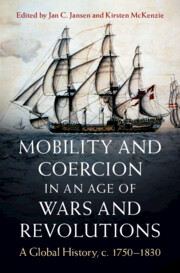Acknowledgments
This volume is the result of a collaboration that extended over many years and across many continents. Most of the authors in this volume were involved in two conferences, the first held in Berlin in June 2018 and the second in Princeton in May 2019. These two meetings were crucial in initiating a conversation between scholars working on coerced mobilities in different historiographic fields and geographic areas. During these meetings, and in an additional virtual meeting in December 2021, the authors worked to build bridges across subdisciplinary fields that tend to remain isolated from each other – despite the obvious similarities and connections between their core research topics and questions. The fruitful conversation that ensued would not have been possible without the crucial support of Linda Colley, who has been involved in this project from the very beginning and who also co-convened the two conferences. The volume that grew out of this collaboration is thus indebted to her and to all the authors’ readiness to commit to an unusually long and intense collective engagement across the delays caused by the Covid-19 pandemic.
We would like to express our deep gratitude to our partners and sponsors of the two in-person meetings. We thank, in particular, the German Historical Institute (GHI), Washington, DC, and its director, Simone Lässig, as well as Princeton University’s Eighteenth Century Seminar. We would also like to thank the International Research Center “Work and Human Lifecycle in Global History” (Re:work) at Humboldt University for kindly hosting the workshop in Berlin and Yair Mintzker for shaping the conference in Princeton. We are grateful to all those who presented papers, gave comments, and chaired sessions at either event: Daniel Beer, David A. Bell, Rafe Blaufarb, Franziska Exeler, Peter Gatrell, Debora Gerstenberger, Felicitas Hentschke, Mischa Honeck, Matthias Middell, Padraic X. Scanlan, and Frederik Schulze, and to all the attendees for their comments and suggestions. We would also like to thank the anonymous reviewers for Cambridge University Press. Likewise, we extend our gratitude to Robert Aldrich, Nicolás A. González Quintero, Jannik Keindorf, Thomas Mareite, Sophie Rose, and Ana Vergara Sierra, and to all the authors of the individual chapters in the published volume for their valuable comments on the outline of the book and the draft of the Introduction. GHI editors Kelly McCullough and David Lazar have been crucial for the success of the project from its very beginning. Together with research assistants James Keating and Johannes Pegel, they helped turn the collection of chapters into a coherent and readable book. Additional thanks go to proofreaders Caroline Fox and Jacob Forbes. The maps in the chapters have been skillfully drawn or redrawn by Laura Vann. This project has received financial support from the European Research Council (ERC) under the European Union’s Horizon 2020 research and innovation program (grant agreement no. 849189 “Atlantic Exiles: Refugees and Revolution in the Atlantic World, 1770s–1820s”) and from the Australian Research Council Discovery Project Grant DP180100537 “Remaking the British World after 1815.”

